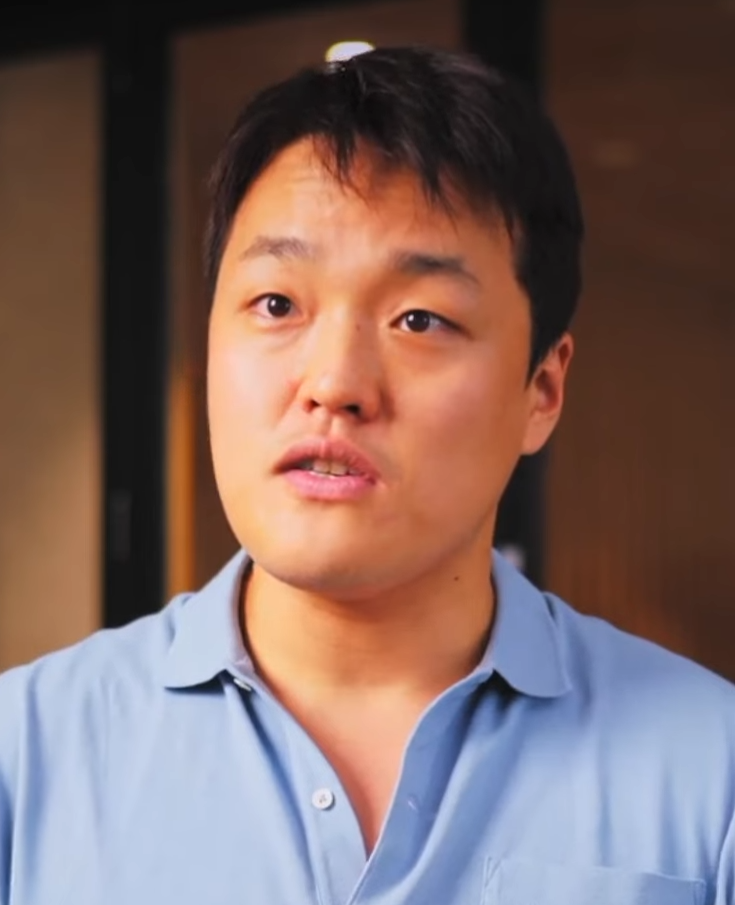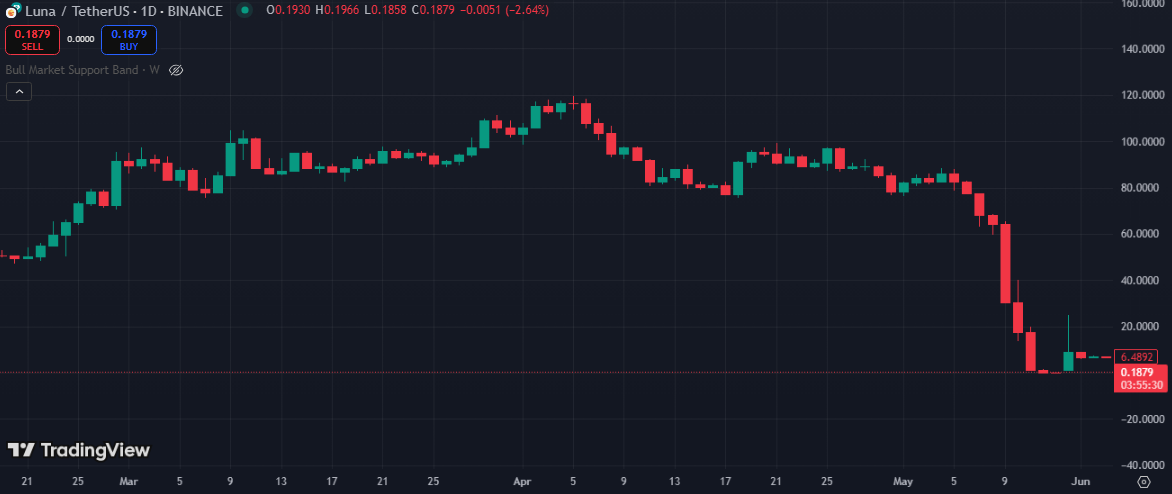On this Page:
Do Kwon, the infamous founder of Terra Luna ($LUNA) and $UST, is remarkably wealthy, despite the implosion of his latest and largest venture. Do Kwon’s current net worth was estimated to be between $135 million to $166 million as of May 2024, based solely on his Bitcoin holdings.
The former Stanford University graduate enjoyed an outstanding rise in the crypto space following the initial success of Terraform Labs and its league of projects, which included Mirror, UST, and LUNA. These projects ballooned his net worth to an estimated $3 billion prior to the devastating crash of the Terra ecosystem in May 2022.
Barely a month later, Terra Luna imploded in Kwon’s face, wiping out 99.9% of its value. The crisis left investors in agony, attracting interventions from authorities across the globe. After being caught using a fake passport in Montenegro, Kwon served a short jail sentence before being extradited to the US. He is currently facing fraud charges in the US, and further criminal charges await him in South Korea and Singapore.

Breaking Down Do Kwon’s Net Worth
| Asset or Income Source | Contribution to Net Worth |
|---|---|
| Previous stakes & salaries | Undisclosed |
| Terraform Labs stake & earnings | Undisclosed |
| Bitcoin holdings | 5,292+ BTC |
| Total Net Worth | $135-166 million |
Do Kwon’s Early Life
Kwon Do-Hyung was born on September 6, 1991, in Seoul, South Korea. He grew up in the country and attended Daewon Foreign Language High School in Seoul. He eventually went to Stanford University, where he earned a B.S. in computer science in 2015. Upon his graduation, he worked briefly at Apple and Microsoft.
Later, Kwon relocated to South Korea and founded a startup known as Anyfi in January 2016, serving as its CEO. Anyfi is a communications platform that leverages mesh network technology. It received $1 million in investment grants at that time, $600,000 of which came from the South Korean Ministry of SMEs and Startups. This would later prove controversial as critics discovered that a member of the ministry was the parent of one of the firm’s founders, constituting a major conflict of interest.
In 2017, the cryptocurrency market experienced a massive boom. Kwon was swept up by the hype and so he pivoted to crypto and focused on writing white paper for a decentralized payment system. In the white paper, Kwon extensively explained how the project would enjoy stability due to its elastic money supply.
The project quickly caught the attention of Daniel Shin, a leader in online payment systems in Korea. Before collaborating with Kwon, Shin co-founded Fast Track Asia, a startup incubator, and co-founded and managed TMON (Ticket Monster), a hit South Korean ecommerce platform.
Launching TerraForm Labs
The partnership between Do Kwon and Daniel Shin led to the creation of Terraform Labs in Seoul in January 2018. The company adopted the mantra of enhancing the adoption of virtual assets and blockchain innovations. In a bid to attain that goal, the firm focused on offering services that they believed to be stable and usable.
Terraform Labs launched its first project in 2018, Chai. Chai is an ecommerce platform that handles payments for Korean consumers and retailers, powered by Terra stablecoins. The project’s focus was to become a major contender to giant payment merchants like Alipay and PayPal. In 2018, Chai became an instant success, recording $32 million in investments.
Despite being in his early twenties at that time, Chai’s success established Kwon as an admirable personality in the tech industry. He began to gain huge media attention and was featured in the 30 under 30 list in 2019. It was later discovered that Chai’s claim that it was using the blockchain to process payments was fraudulent, with the SEC successfully filing charges in 2024.
In April 2022, Kwon became so carried away by the early wins of his project to the extent that he named his daughter “Luna” after the native token of the Terra blockchain.
Baby Luna 💛
My dearest creation named after my greatest invention pic.twitter.com/clGvoPhdaF
— Do Kwon 🌕 (@stablekwon) April 17, 2022
Terra BlockChain and Luna Token
Following the initial success of Chai, Terraform Labs launched the Terra blockchain alongside its native token, LUNA. The blockchain was designed to be decentralized and open source, providing a platform for decentralized applications (dApps). Kwon created the blockchain through support from prominent tech entrepreneurs, like Lee Tae-jin and JB Lee.
The launch of Terra attracted the attention of Binance, Changpeng Zhao’s crypto exchange, because of its scalability and stability. Then, the exchange invested $1.6 billion in the project. Likewise, it acknowledged the contribution and “earnest commitment” of Do Kwon and Daniel Shin to the advancement of the industry. In June 2020, Terra Labs launched the Chai Card for Korean users.
1/ @terra_money has finally launched the Chai card. Korean users, preregister here: https://t.co/3ko5y6gnLy pic.twitter.com/mpLCWkkuFn
— Do Kwon 🌕 (@stablekwon) July 2, 2020
On September 21, 2020, the firm launched the stablecoin TerraUSD or UST on the Terra blockchain in collaboration with Bittrex Global. The stablecoin maintained its $1 peg through an algorithm linked to the supply of LUNA. Anyone could redeem 1 LUNA token for 1 UST or 1 UST for $1 in LUNA (until the implosion), betting on arbitrageurs to sustain the peg.
Barely a year later, the firm also developed the Anchor protocol. Anchor offered shockingly high returns on users deposits (~20% APY) and it allowed users to borrow against their crypto holdings. Kwon also established the Luna Foundation Guard (LFG) on January 19, 2022 to support UST and LUNA. The LFG had the ultimate goal of acquiring $10 billion worth of BTC to provide reserves for the two tokens.
With the support of notable investors and the LFG, UST enjoyed an incredible rise, outperforming established stablecoins like TerraUSD GUSD (Gemini) and PAX (Paxos). Earning 20% interest on stablecoins was quite the draw for millions of crypto investors, many of whom didn’t understand the risk inherent in the system. This noticeable progress was reflected in the value of LUNA as the token hit an all-time high of $116 in April 2022, up from a price of $1.00 in 2021.
LFG’s consistent purchase of BTC at that time likely contributed to the remarkable success. In May 2022, LFG acquired $1.5 billion worth of BTC. During this period, LUNA became one of the ten largest cryptocurrencies by trading volume.
Kwon founded other smaller projects during his time at Terraform Labs. They include Mirror, Prism, and Astroport.
The Collapse of Terra UST and LUNA
The genesis of the UST and LUNA crisis surfaced on May 7, 2022, less than a month after the native token recorded its all-time high. First, a bot that observes voluminous crypto transactions, Curve Whale Watching, tweeted that 85 million UST was swapped for 84.5 million USDC. This development resulted in a 10% dip in the value of LUNA, dropping it below a dollar and thereby forcing the UST to lose its peg to the U.S. dollar.
As the news of the implosion began to dominate the crypto community, Kwon called for calm. Then, he assured users that he would control the situation, saying, “Deploying more capital – steady lads.”
Deploying more capital – steady lads
— Do Kwon 🌕 (@stablekwon) May 9, 2022
In just a few hours, over $2 billion worth of UST were unstaked from the Anchor Protocol and many investors dumped their tokens immediately. Some investors hoped that UST would eventually recover and held on to their tokens, but it was too late.
Arbitrageurs were no longer confident that UST would be able to reach the peg again, so they mostly stopped redeeming UST and LUNA tokens and started selling them off, bringing the entire Terra ecosystem to its knees.
Kwon and his team halted the Terra blockchain on two different occasions to try to stop the bleeding, but it wasn’t enough. By May 20, Terra had lost $28 billion.
As the crisis deepened, the crypto market plummeted. The crash wiped out $50 billion in market capitalization and $400 billion in losses in broader crypto markets. During this period, LUNA and UST dropped from a value of $87 and $1 to a value of $0.00005 and $.20 respectively. The crisis made most cryptocurrencies, including Bitcoin and Ethereum, crash. The market didn’t recover to its previous levels for almost two years following the disaster.
LUNA/USDT chart | SOURCE: Trading View
In a last-minute attempt to save the situation, the LFG sold some portion of its BTC reserve. Unfortunately, the effort could not save the asset from collapse.
1/ Over the past several days, market volatility across crypto assets has been significant.
The market turmoil is also reflected by the past week's uncertain macro conditions across legacy asset classes.
— LFG | Luna Foundation Guard (@LFG_org) May 9, 2022
On May 19, 2023, Hashed, a well-known Terra-supporter venture fund based in Seoul, South Korea, reportedly lost $3.5 billion to the crisis. Later that month, Terra validators voted to approve Do Kwon’s plan to launch a new blockchain, Terra 2.0.
The new network had no stablecoin, unlike its predecessor. Eventually, Kwon launched Terra 2.0, with support from a few crypto exchanges. The project came alive to incentivize holders of the UST and LUNA tokens who lost their investment to the crisis but it failed to catch on.
1/ Yesterday, we said Terra 2.0 is coming. Tomorrow, it arrives.
The community has been working around the clock to coordinate the new chain’s launch. Subject to potential change, we expect Terra to go live on May 28th, 2022 at around 06:00 AM UTC.
— Terra 🌍 Powered by LUNA 🌕 (@terra_money) May 27, 2022
Legal Battles and Controversy
Prior to the collapse of Terra, reports surfaced that it sued the U.S. Securities and Exchange Commission (SEC). The lawsuit emanated from the subpoena issued by the regulator against the company at the Messari Mainnet conference. The SEC demanded that Kwon provide testimony regarding the activities of Mirror Protocol. Kwon’s belief has always been that the SEC should not regulate crypto, though his history of failure and (alleged) fraud doesn’t exactly support his argument.
The SEC doesn't regulate currencies, ser
— Do Kwon 🌕 (@stablekwon) July 14, 2021
Kwon was also investigated by members of parliament and government agencies in Korea.
The National Tax Service of South Korea directed Kwon and Shin to pay $100 million in taxes for their December 2021 earnings. Naturally, they didn’t want to pay up and argued that their firms were not based in the country. Nonetheless, the agency insisted that the founders made management decisions while residing in South Korea, thereby positioning their respective companies and earnings under its jurisdiction.
Barely a few months after the demise of Terra, investors across various countries, including the United States and South Korea, filed a class action lawsuit against Kwon and Terraform Labs. In addition, the South Korean government also leveled criminal charges against Do Kwon.
In May 2022, Kwon’s spouse requested emergency police protection after an intruder allegedly invaded their apartment.
Terra Luna Lawsuits in U.S., Singapore, and South Korea
In the U.S., a class action, Patterson v. TerraForm Labs Pte Ltd. et al., was filed against Kwon with the U.S. District Court for the Northern District of California. In the lawsuit, Do Kwon and Terraform Labs were accused of marketing unregistered securities. The investors also argued that the CEO and his company deceived them about the project.
The Terraform Labs co-founder is facing another similar legal battle in Singapore. The $56.9 million class action was filed at the Singapore High Court around September 2022. The same month, Interpol issued a red notice against Do Kwon. The notice gave a green light to law enforcement agencies across the globe to search and arrest the Terraform Labs founder.
Similarly, a court in South Korea also issued an arrest warrant for Kwon and five others. The court accused Kwon and his accomplice of violating capital market laws in the country. Then, prosecutors alleged that the CEO of Terraform Labs was hiding in Serbia. Despite these reports, Do Kwon argued on his X account that he was not on the run.
Yeah as i said im making zero effort to hide
I go on walks and malls, no way none of CT hasnt run into me the past couple weeks
— Do Kwon 🌕 (@stablekwon) September 26, 2022
Later, Seoul Southern District Prosecutors’ revoked Kwon’s travel documents. In an interview around October 2022, Kwon said he was not bothered about the invalidation of his passport by the South Korean government, claiming that he does not use it. Again, he was asked if he had another passport, and Kwon replied that he didn’t feel comfortable discussing his travel plans.
In the video below, Kwon discusses the numerous allegations against him.
In February 2023, the SEC charged Do Kwon and TerraForm Labs for “orchestrating a multi-billion dollar crypto asset securities fraud.”
After efforts to uncover the whereabouts of Kwon, he was eventually arrested at the Podgorica Airport in Montenegro, on March 23, 2023. He was apprehended on his way to Dubai with fake Costa Rican traveling documents. He reportedly had a fake Belgian travel document with him as well.
Upon his arrest, authorities in Montenegro charged Kwon for document forgery. On May 11, 2023, Kwon pleaded not guilty but was convicted and sentenced to four months in prison by a Montenegrin court for using fake traveling documents. Amid the jail sentence, authorities in the U.S. and South Korea made efforts to secure the extradition of Kwon, even though Montenegro has no extradition agreement with the US.
In June, evidence from his confiscated private computer indicated that he provided financial support for the election campaigns of multiple top officials in the Government of Montenegro.
Barely a month later, reports indicated that South Korean prosecutors considered submitting the recent U.S. ruling on Ripple cryptocurrency to a Seoul court. The ruling is significant because the court ruled that Ripple Lab’s sale of Ripple did not constitute the sale of a security, a stance Kwon long maintained about his tokens. However, the ruling maintained that Ripple’s institutional sales of XRP did meet the criteria for an unregistered sale of securities.
Korean prosecutors also wanted to prove that LUNA is a financial security under Korean law. As part of its bid to prosecute Do Kwon, the Seoul Southern District Prosecutor’s Office recently received a translated version of the ruling on the SEC vs Ripple lawsuit.
A Controversial Personality
Do Kwon’s personality has been criticized for many years even before the collapse of Terraform Labs. One of his critics at that time, Kevin Zhou foresaw the collapse of Terra even at the height of its ascent. Kwon was always quick to respond to all those “outbursts” about his project, often insinuating that his critics are poor.
In an interview with Laura Shin, Kwon was asked whether he regrets the image he portrayed prior to the collapse of his project. He said, “I think I got carried away with interacting with other people on Crypto Twitter. So the industry lingo for this is called sh*t posting. In retrospect, I think I should have held myself to a more stringent standard.”
Kwon denied that the project was a rug pull, insisting that the collapse was caused by weaknesses in its protocol design. However, he accepted full responsibility for the collapse and apologized to all affected investors.
“Whatever issues existed with Terra’s design, its weakness to respond to the cruelty of the markets, it’s my responsibility and my responsibility alone,” he said.
Do Kwon’s Crypto and NFT Holdings
When Terra was at its peak, Do Kwon’s personal crypto portfolio was worth billions of dollars. Although he claimed to have lost almost all his net worth to the implosion, findings from ongoing probes into the incident have proven otherwise. Recently, Hansung University Blockchain Research Institute analyzed on-chain data that showed how the Terra co-founder moved over $109 million in digital assets to his private wallets and exchange accounts prior to the collapse of the project. This revelation indicates that Kwon likely anticipated the eventual demise of Terra.
According to on-chain data, Kwon started moving the funds around December 2021. Then, he transferred UST, USDC, and WBTC from two Terra wallets to his personal wallets on the Ethereum network through the Wormhole bridge. In November 2022, one of Kwon’s wallets contained 6,983 Bitcoin as well as other cryptocurrencies.
These revelations have continued to aid prosecutors in their investigations against Do Kwon and his fellow co-founder, Daniel Shin.
Amid efforts to identify and freeze these assets, Whale Alert reported the transfer of about 5,292 BTC from Kwon’s main wallet to a new anonymous wallet. Prosecutors still don’t know how these coins were moved.
🚨 🚨 🚨 🚨 🚨 🚨 🚨 5,292 #BTC (162,439,939 USD) transferred from unknown wallet to unknown wallethttps://t.co/yVq6fde9yd
— Whale Alert (@whale_alert) July 3, 2023
Recently, the U.S. SEC alleged that Kwon moved 10,000 BTCs to a Swiss account at Sygnum Bank. Immediately, the Swiss prosecutors acted on the information and eventually seized $26 million in digital assets.
Do Kwon’s Net Worth – Our Verdict
Do Kwon’s meteoric rise and fall is indicative of the volatility and risk unique to the world of cryptocurrency, and is an important cautionary tale about how easily wealth can come and go. But even after the wild ride that Terraform Labs experienced, Kwon was still able to amass a net worth of well over one hundred million dollars (though it likely won’t last, given his legal troubles).
Unfortunately, many of the investors who chose to get swept up in Terra’s roller-coaster climb did not predict how quickly it would crater or how poorly Kwon would handle the aftermath. His choice to use fake travel documents in an attempt to evade authorities, his arrogance online, and the instability of what was supposed to be a stablecoin damaged the credibility of not only himself but of the industry and ecosystem as a whole.
The aftermath of the crisis was so disastrous that some of the investors contemplated suicide after losing their life savings to the project. Countless investors lost billions of dollars collectively, all because of the shoddy system that Kwon built up and profited tremendously from.
Do Kwon was extradited from Montenegro to the U.S. on December 31, 2024, following a protracted legal battle. He now faces charges in New York related to the collapse of the Terra ecosystem. The charges include securities fraud, commodities fraud, wire fraud, conspiracy, and money laundering. However, he has maintained his innocence.
FAQs
Why was Do Kwon jailed in Montenegro?
Do Kwon was jailed for four months in Montenegro because he was found guilty of forging a passport.
What is Do Kwon's current net worth?
The current net worth of Do Kwon is estimated to be between $135 to $166 million, though it is possible that it could be higher.
When did the Terra project crash?
Do Kwon’s Terra project crashed in May 2022.
What were the two cryptocurrencies associated with Terraform Labs?
LUNA and TerraUSD (UST).
What is a stablecoin?
A stablecoin is a cryptocurrency designed to have a stable price, pegged to the value of an asset like the U.S. dollar.


